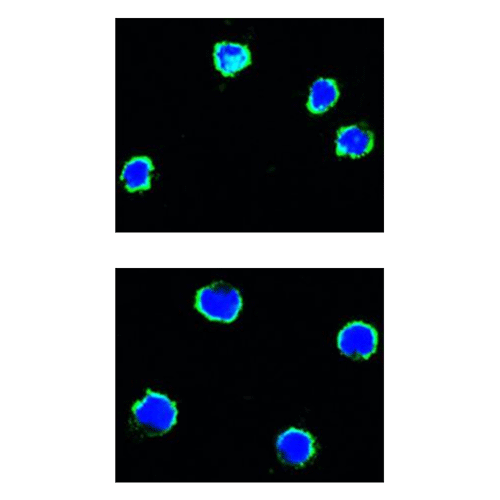Anti-CD40: Mouse Cluster of Differentiation 40 Antibody |
 |
BACKGROUND CD40 is a member of the TNF-receptor superfamily. This receptor has been found to be essential in mediating a broad variety of immune and inflammatory responses including T cell-dependent immunoglobulin class switching, memory B cell development, and germinal center formation. AT-hook transcription factor AKNA is reported to coordinately regulate the expression of this receptor and its ligand, which may be important for homotypic cell interactions. Adaptor protein TNFR2 interacts with this receptor and serves as a mediator of the signal transduction.1 The interaction of this receptor and its ligand is found to be necessary for amyloid-beta-induced microglial activation, and thus is thought to be an early event in Alzheimer disease pathogenesis.2 Two alternatively spliced transcript variants of this gene encoding distinct isoforms have been reported.
REFERENCES
1. Klaus, G.G.B. et al: Int. Rev. Immunol. 15:5-31,1997
2. Togo, T. et al: Brain Res. 885:117-21, 2000
2. Togo, T. et al: Brain Res. 885:117-21, 2000
Products are for research use only. They are not intended for human, animal, or diagnostic applications.
Параметры
Cat.No.: | CP10045 |
Antigen: | Purified recombinant human CD40 protein fragments expressed in E. coli. |
Isotype: | Mouse IgG1 |
Species & predicted species cross- reactivity ( ): | Human |
Applications & Suggested starting dilutions:* | WB n/d IP n/d IHC n/d ICC 1:50 FACS n/d |
Predicted Molecular Weight of protein: | 48-50 kDa |
Specificity/Sensitivity: | Detects endogenous CD40 proteins in normal cell lysates without cross-reactivity with other family members. |
Storage: | Store at -20°C, 4°C for frequent use. Avoid repeated freeze-thaw cycles. |
*Optimal working dilutions must be determined by end user.
Документы
Информация представлена исключительно в ознакомительных целях и ни при каких условиях не является публичной офертой








